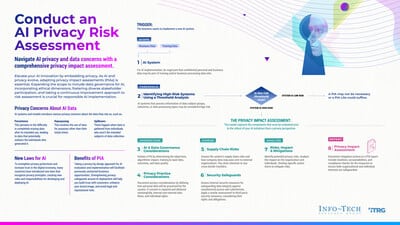Artificial Intelligence (AI) is transforming operations in many organizations across the globe, raising pertinent concerns about privacy rights. Info-Tech Research Group has recently stepped up, releasing its research titled ‘Conduct an AI Privacy Risk Assessment.’ The research aims to guide IT leaders on embedding privacy into AI technologies while pursuing ethical and regulated data practices.
Addressing Privacy Concerns in AI Adoption
As the use of AI continues to surge forward, privacy issues grow parallelly, often marked by ethical and operational challenges. Info-Tech is addressing these worries by integrating a privacy impact assessment (PIA) into AI plans. PIA offers a definite system that companies can use to evaluate potential privacy risks, ensure informed consent, and limit data collection.
Balancing AI Innovation and Data Privacy Regulation
The Info-Tech blueprint pinpoints the critical task of achieving a balance between AI’s transformative potential and necessary regulation. Amidst ambiguous data protection regulations and complex data dynamics, the organization proposes stronger data governance for AI. Besides, fostering diverse stakeholder involvement and consistently improving risk assessments are recommended as crucial elements for responsible AI adoption.
The Essential Role of Data Privacy in AI Implementation
Info-Tech’s framework provides comprehensive guidance on conducting PIAs for AI technologies. From understanding the handling of confidential data within AI systems to assessing potential supply chain risks and identifying privacy risks for mitigation, the guideline emphasizes the crucial role of data privacy. This blueprint calls for capacity building in data privacy principles and awareness, positioning them as a cornerstone of successful organizational values and operations.
In conclusion, Info-Tech Research Group strongly advocates embedding data privacy into the fabric of AI initiatives. This proactive privacy-first approach not only guarantees compliance and fosters trust among stakeholders but also shapes the future of ethical and responsible AI adaption in organizational conduct. This shift towards privacy-conscious AI use is undoubtedly driving a new narrative in the field of technology.
Don’t miss our latest Startup News: Sensor Tower’s Game-Changing Acquisition of Data.ai
